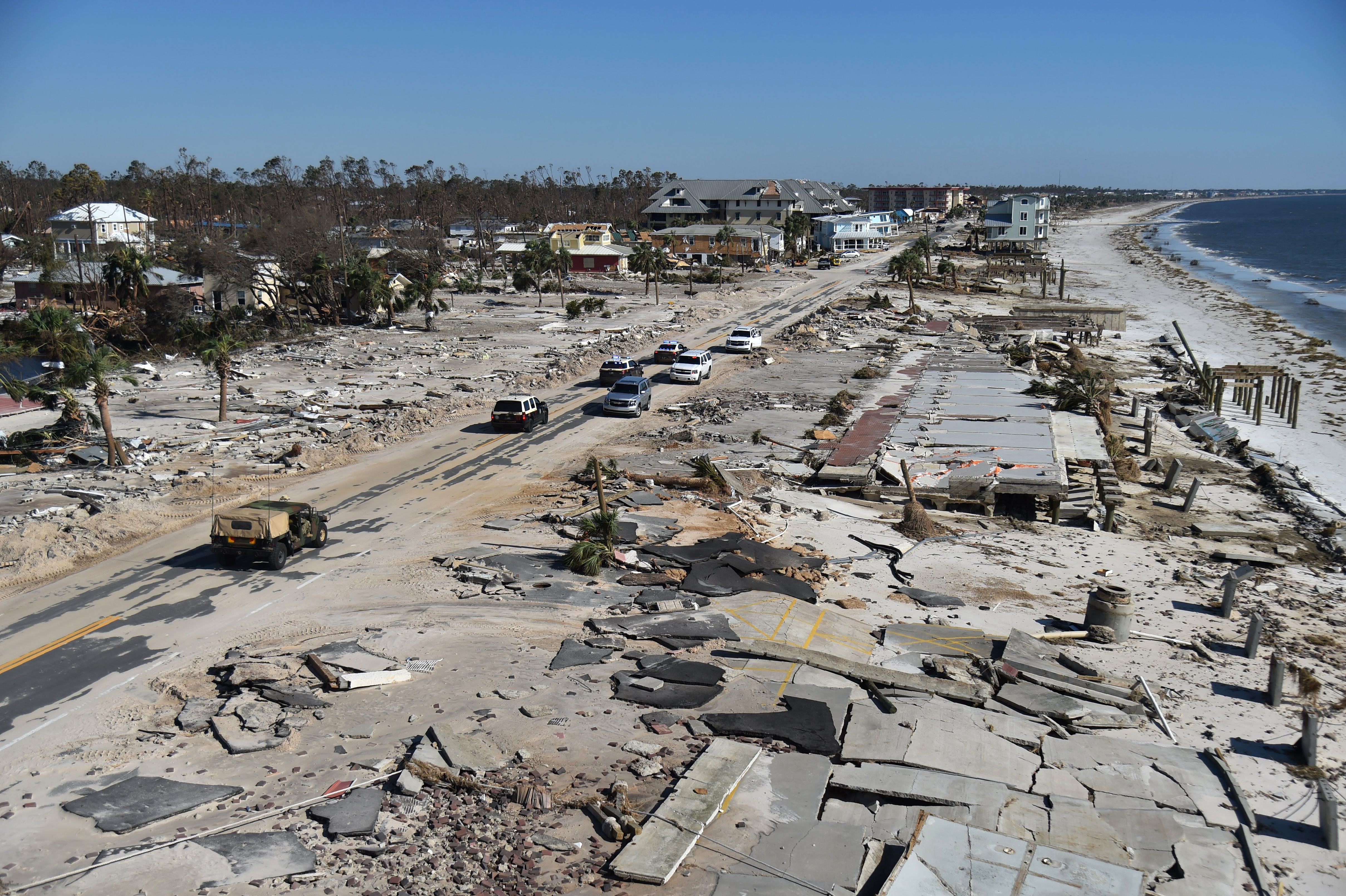Hurricane Michael death toll hits 17, officials say it could rise
View of the damage caused by Hurricane Michael in Mexico Beach, Florida — the death toll is now at 17 and officials warn it could rise (HECTOR RETAMAL)
Panama City (United States) (AFP) – Three days after Hurricane Michael’s devastating strike, search teams in Florida pressed their hunt for victims into hard-to-reach areas Saturday, as the death toll rose to 17 and officials scrambled to deliver aid to those who lost everything.
The mammoth storm, which made landfall as a Category 4 storm on Wednesday, claimed lives in four states, but Florida suffered the worst damage by far.
Large parts of the state’s panhandle were pulverized by the strong winds and rain, and eight storm-related deaths have been reported in Florida so far.
“Mexico Beach is devastated,” Governor Rick Scott said of the town hardest hit by the hurricane, the most powerful to hit the United States in decades.
“It’s like a war zone,” he said while touring the town of 1,000 people on the Gulf of Mexico.
Rescue teams with sniffer dogs were searching for possible victims buried under the rubble in the debris-strewn community.
US media have reported one death in the town — the body of an elderly man was found hundreds of yards (meters) from his home.
Brock Long, head of the Federal Emergency Management Agency (FEMA), warned that the death toll could yet rise.
“I hope we don’t see it climb dramatically. But I have reasons to believe we still haven’t got into some of the hardest-hit areas,” he said.
Government and private relief centers were opening up to provide badly needed food, water and other aid to people whose lives were upended by the monster storm.
As somber residents began making it back to homes still intact, officials said it could take 10 days to compile a final damage estimate.
In Mexico Beach, dozens of structures — homes, shops and restaurants — were lifted off their foundations by storm surge and winds of 155 miles per hour (250 kph).
Some were moved hundreds of feet inland while others were simply smashed to bits.
“Very few people live to tell what it’s like to experience storm surge,” Long said. “Storm surge causes the most amount of loss of life.”
Building codes on Florida’s Panhandle, in the state’s northwest, are less rigorous than in the state’s south, where severe hurricanes hit more frequently.
The devastation wrought by Michael has sparked debate on whether an era of warming oceans and more severe storms might require tougher building standards in coastal areas.
Underlining the unpredictability of modern storms, a category one hurricane dubbed Leslie was heading Saturday on a highly unusual path toward the Iberian peninsula.
– Nothing left to save –
Across the storm-hit US region, relief efforts were shaping up.
In Panama City, Florida, the Salvation Army and other charitable groups opened distribution points for food and supplies. A few stores were reopening, and cars lined up at the few open gas stations.
At the city’s St. Andrew Baptist Church, associate pastor Mark Bateman told AFP the church was gearing up to feed up to 500 people, with supplies — including pet food — provided by a statewide Baptist group.
“We’re doing good,” Bateman said, despite damage to the church’s roof. “But lots of our members are not doing so well.”
Back in Mexico Beach, residents were picking up the pieces.
“I spent my life savings and retirement to stay here. So I can’t sell it now,” retiree Bob Tenbrunson told AFP. “I can’t sell it now. So I just have to be hopeful that (the city) will be rebuilt and fixed.”
But some found nothing left to save.
Beyond Florida, five storm-related deaths were reported in Virginia — including that of a fireman whose firetruck was struck by a semitrailer truck. One died in Georgia and three more were killed in North Carolina.
Hundreds of thousands of people remain without electricity in Florida, Georgia and Virginia, and officials say that, even with line crews arriving from across the country, it could be weeks before power is fully restored.
– Communication problems –
Meanwhile, a wide swath of Florida’s northwest coast has been without telephone or Internet service, adding to the daunting challenges facing residents, loved ones trying to reach them, and the work crews struggling to bring them relief.
Daniel Fraga, an electrician, told AFP he has only an extremely weak and intermittent signal.
“Basically everything has shut down,” he said, adding that there are “too many people on the same service.”
Governor Scott tweeted Saturday that cellphone provider AT&T was providing resources in impacted areas, “including sending numerous phones and other mobile resources that will enhance communication for first responders.”
President Donald Trump said he planned to visit Florida and Georgia early next week, tweeting, “We are working very hard on every area and every state that was hit — we are with you!”
The Pentagon said about 5,000 US servicemen were deployed to help with relief and recovery efforts, using 100 helicopters and 1,800 high-water vehicles.
Tyndall Air Force Base, home to F-22 stealth fighters, suffered extensive damage, according to aerial photos of the coastal facility.
Disclaimer: This story has not been edited by Siliconeer and is published from a syndicated feed. Siliconeer does not assume any liability for the above story. Validity of the above story is for 7 Days from original date of publishing. Content copyright AFP.


